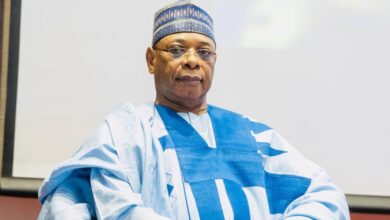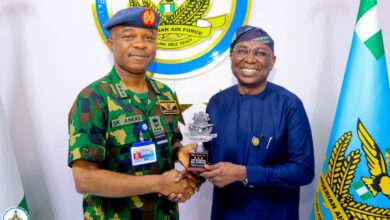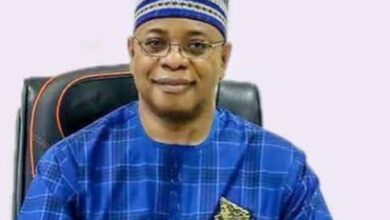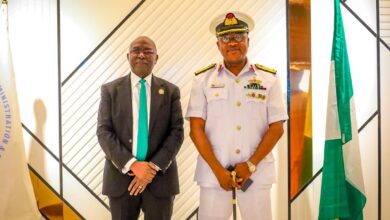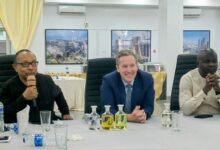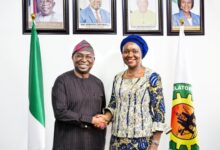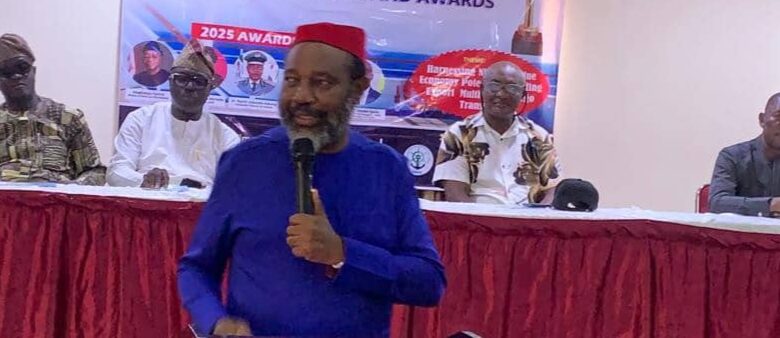
The Head of Research at the Sea Empowerment and Research Centre (SEREC), Dr. Eugene Nweke, has highlighted the importance of the Blue Economy, asserting that it is pivotal to Nigeria’s industrial revival.
Dr Nweke stated this at the 2025 Annual Conference of the Association of Maritime Journalists of Nigeria (AMJON), themed “Harnessing Nigeria’s Blue Economy Potential, Boosting Export Trade and Multimodal Cargo Transport”, held at Rockview Hotel, Apapa, Lagos, on Thursday, November 13, 2025.
Delivering a paper titled “The Essentials of Public-Private Synergy for Optimal Marine and Blue Economy Policy Implementation”, Chief Nweke explained that the Blue Economy represents the sustainable use of ocean resources for economic growth, improved livelihoods, and job creation — while preserving marine ecosystem health.
“Globally, it contributes over US$2.5 trillion annually and supports more than 350 million jobs (OECD, 2023). Nigeria, blessed with 853 km of coastline, over 3,000 km of inland waterways, and a 200-nautical-mile Exclusive Economic Zone, is strategically located as West and Central Africa’s maritime gateway.
“Yet, our national contribution to regional maritime GDP remains below 1.5% — a paradox of potential and performance. This underscores the urgent need for Public–Private Synergy (PPS) — a coordinated mechanism that transforms policy frameworks into measurable economic and industrial outcomes,” he stated.
On Conceptual Framing and Understanding Public–Private Synergy, Dr. Nweke noted that PPS extends beyond conventional PPP arrangements, stressing that it embodies a developmental alliance where government, private investors, academia, and communities share responsibility for co-creating, co-financing, and co-monitoring blue economy initiatives.
He pointed out that the public sector provides policy clarity, infrastructure, and regulatory stability while the private sector contributes innovation, efficiency, and finance. Nweke also noted that communities and academia supply local inclusion, sustainability, and human capacity.
He added that the PPS is not just cooperation but a shared governance approach, built on trust, transparency, and technology.
Dr. Nweke further highlighted the Blue Economy Pillars and Nigeria’s Untapped Value Chains, disclosing that the Federal Ministry of Marine and Blue Economy has outlined five key pillars for national maritime transformation, including Fisheries and Aquaculture; Shipping, Ports, and Logistics; Tourism and Coastal Infrastructure; Energy and Marine Resources; and Research, Data, and Governance.
On Fisheries and Aquaculture, the maritime expert stated that Nigeria’s fish demand exceeds 3.6 million metric tonnes annually, while domestic production is only 1.5 million tonnes, creating a 2.1 million-tonne deficit worth over US$1 billion in imports. He added that PPPs in aquaculture, cold-chain logistics, and fish processing can bridge this gap and create 500,000 jobs.
With reference to Shipping, Ports, and Logistics, Fwdr. Nweke explained that Nigerian ports handle 70 million metric tonnes of cargo yearly, but operational inefficiencies and weak policy framework make logistics costs 35–40% higher than regional peers. He also mentioned that integrated port automation and multimodal connectivity can save ₦3 trillion annually in trade costs.
Regarding Tourism and Coastal Infrastructure, he disclosed that only 5% of Nigeria’s coastline is harnessed for tourism, emphasising that developing marine leisure and cruise projects can yield US$3 billion annually.
While explaining Energy and Marine Resources, Chief Nweke asserted that offshore gas, renewables, and seabed minerals could add US$10 billion annually if sustainably developed through PPPs.
He further stated that with Research, Data, and Governance, establishing a National Maritime Data Repository (NMDR) will unify sectoral data, strengthen regulation, and support investment forecasting.
Nweke also delved into Steel, Mining and Agriculture (Circular Linkages with the Blue Economy), noting that Nigeria’s vast scrap steel deposits offer a dual opportunity — environmental remediation and industrial rejuvenation.
According to him, when properly integrated into the Blue Economy, this “scrap-to-steel circular chain” can power a new industrial age along Nigeria’s coastal corridor.
On Shipbuilding and Repairs, he said that locally recycled steel can serve as raw material for hulls, decks, and dry-dock components, reducing import dependence, while Bunkering and Coastal Infrastructure ensures steel fabrication supports safe storage tanks, jetties, barges, and marine engineering works.
Linking this to job creation, Nweke pointed out that a structured national scrap recovery and steel reprocessing system could generate over 200,000 direct and indirect jobs, adding that environmental gains with regulated ship recycling and scrap recovery will curb coastal pollution and unsafe dismantling practices.
“Similarly, linkages with the mining and agricultural sectors can stimulate value-added processing, storage, and export logistics. Locally processed steel can feed agro-machinery fabrication, silos, and processing equipment, boosting Nigeria’s non-oil export base.”
Speaking on Ajaokuta Steel and the National Industrial Backbone, the expert said that beyond recycled materials, Nigeria’s natural steel endowment, anchored by the Ajaokuta Steel Rolling Mill and Itakpe iron ore complex, remains a sleeping giant in the country’s industrial landscape.
“Ajaokuta was originally designed to provide the heavy industrial foundation for shipbuilding, port infrastructure, rail fabrication, and offshore platforms. Decades of neglect, however, have denied Nigeria the full benefits of this strategic asset,” he stated, emphasising that reviving Ajaokuta and aligning its production with Blue Economy objectives will guarantee domestic supply of marine-grade steel for shipyards and coastal engineering projects.
He spotlighted other possibilities, including creating integrated value chains linking mining, metallurgy, shipping, and logistics; enhancing export competitiveness by reducing input costs; and establishing Nigeria as West and Central Africa’s marine fabrication hub.
“Furthermore, with a thriving steel sector under the Blue Economy era, the automobile industry will gain unprecedented acceleration. Locally sourced steel will lower manufacturing costs, attract component producers, and provide an enabling environment for indigenous automobile assembly plants, thereby reducing import dependence and conserving foreign exchange.
“Thus, a revitalized steel ecosystem — both recycled and natural — is not just an industrial objective but a strategic enabler of Nigeria’s maritime, transport, and automotive transformation.”
Pertaining to Essentials of Effective Public–Private Synergy, Nweke highlighted five steps, including Regulatory Clarity and Institutional Coordination; Transparent PPP Framework; Fiscal and Investment Incentives; Community and Indigenous Participation; and Technology, Innovation, and Human Capital.
He explained each as follows:
Regulatory Clarity and Institutional Coordination:
– Harmonise overlapping mandates among NPA, NIMASA, NIWA, and NSC.
– Adopt a Unified Maritime Policy Implementation Framework (UMPIF) with shared deliverables and measurable performance indicators.
Transparent PPP Framework:
– Empower ICRC for faster project approvals and concession oversight.
– Establish independent monitoring and open data dashboards for all PPP projects.
Fiscal and Investment Incentives:
– Introduce tax holidays and financing guarantees for investors in shipyards, barging, and blue infrastructure.
– Reform the CVFF to promote indigenous co-ownership and capacity building.
Community and Indigenous Participation:
– Create Coastal Community Development Trusts (CCDT) to ensure benefit-sharing and local employment.
Technology, Innovation, and Human Capital:
– Establish Blue Innovation Hubs linking research institutions, tech firms, and maritime agencies for AI-driven port analytics and marine logistics.
Dr. Nweke emphasised the importance of ICT-Driven Automation in relation to National Single Window (NSW) and International Cargo Tracking Note (ICTN) as Blue Economy Enablers, stating that digitalisation is the new vessel of maritime trade. He affirmed that the NSW and ICTN are the anchors of transparent, efficient, and data-driven marine commerce.
While the National Single Window integrates documentation and inspection processes into one digital interface — reducing clearance times by 40% and saving ₦500 billion annually, the ICTN tracks cargo from port of origin to destination, curbing under-declaration, revenue leakages, and cargo diversion.
On synergy, Fwdr. Nweke mentioned that together, they enhance revenue assurance, security, and investment confidence while creating digital jobs in marine data analytics. “These tools form the digital backbone of Nigeria’s Marine & Blue Economy, promoting accountability and competitiveness.”
The maritime expert also stressed the significance of transport intermodalism and regulation of barge operations, explaining that a thriving Blue Economy depends on intermodal connectivity — the seamless integration of maritime transport with rail, road, pipeline, and inland waterways.
He said that intermodalism ensures cargo moves efficiently between ports and hinterland industries, cutting logistics costs by up to 35% and driving export competitiveness.
Role of Barge Operations:
– Barges provide an eco-friendly, cost-effective link between seaports and inland destinations. They decongest ports, reduce road traffic, and enhance cargo distribution.
Essentials for Sustainable Barge Development:
– National Barge Operations and Safety Framework — unified guidelines under NIMASA/NIWA/NPA for certification and safety.
– National Barge Register — linked to ICTN and NSW for real-time vessel tracking and compliance.
– Public–Private Barge Infrastructure Partnerships.
– Dredging and Channel Maintenance for year-round navigability.
– Intermodal Integration: connecting barges with rail and road terminals nationwide.
Similarly, he disclosed the economic outcome, asserting that sustainable barge operations could create 150,000 new jobs, decongest ports by 50%, and open up inland industrial growth corridors.
“Intermodal transport is therefore the operational spine of the Blue Economy — ensuring coastal waters become efficient arteries of national productivity,” he added.
In his case studies and data insights, Nweke referenced Mauritius, revealing that it increased blue economy GDP share from 10% (2015) to 19% (2022) through PPPs in fisheries and tourism.
He also referenced Ghana, noting that its Takoradi Port PPP attracted $350 million in private capital, doubling throughput and cutting public cost by half.
He further outlined Nigeria’s Lekki Deep Sea Port ($1.5 billion PPP) with 75% private/25% public investment; 200,000 projected jobs; 2.5 million TEUs annual capacity; and 30% expected logistics cost reduction.
Nweke said that the examples demonstrate that synergy, structure, and innovation are the pillars of a thriving maritime future.
He identified six strategic pathways for Nigeria, including Establishing a National Blue Economy Council (NBEC) chaired by the Vice President; Making PPP the default approach for all marine infrastructure projects; and Enacting a Blue Economy Investment Code integrating environmental, fiscal, and industrial incentives.
Other pathways included Operationalising the National Maritime Data Repository (NMDR); Institutionalising Public–Private Blue Economy Roundtables (PBBIR) for quarterly policy and investment reviews; and Integrating Ajaokuta Steel, Inland Mining, and Intermodal Logistics into national Blue Economy planning.
The expert maintained that the success of Nigeria’s Marine and Blue Economy will not be measured by the number of policies announced, but by the industries revived, the jobs created, and the prosperity sustained.
He urged the public sector to ensure regulatory clarity and continuity, and the private sector to drive innovation, technology, and financing. He also encouraged the media to sustain transparency and advocacy, and ultimately urged communities to anchor the sustainability of this collective journey. “Together, we can steer Nigeria’s Marine & Blue Economy from potential to productivity, from policy to prosperity, and from promises to performance.”
He further recommended the creation of a Public–Private Blue Economy Implementation Roundtable (PBBIR) — a standing platform to coordinate key MDAs, investors, and community stakeholders, using ICTN and NSW data to track investment flows, policy compliance, and job outcomes quarterly.


